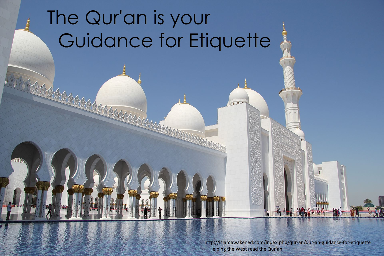Jesus the Muslim
We hear a great deal today about a “war,” “conflict,” or “clash” between Islam and Christianity. The topic is so prominent in the media that many people assume that there is something irreconcilable between these two approaches to God. It is not surprising, then, that so many Christians of good will have concluded that Islam and Christianity are fundamentally incompatible. Yet, if, by “Christianity,” we mean “that which Jesus Christ (pbuh) meant to convey to his hearers,” I believe that these people of good will are mistaken when they tell us that Islam is incompatible with Christianity.
What’s more, I believe we can now prove that the historically oldest Gospel verses reflecting the reported sayings of Jesus (pbuh) are entirely compatible with Islam.
A WAVE OF CONVERSIONS
If you are a Christian, the idea that Jesus (pbuh) practiced the same faith that today’s news broadcasts hold responsible for so many of the world’s problems may seem far-fetched to you. It seemed far-fetched to me when I first encountered it, before I consulted the Gospels closely. Yet you should know that many, many contemporary Christians have reached life-changing personal conclusions about the Gospel message and its relation to Islam.
“There is compelling anecdotal evidence of a surge in conversions to Islam since September 11, not just in Britain, but across Europe and America. One Dutch Islamic centre claims a tenfold increase, while the New Muslims Project, based in Leicester and run by a former Irish Roman Catholic housewife, reports a steady stream of new converts.” (London Times, January 7, 2002.)
MAINSTREAM MEDIA IGNORES US
The Western news media only rarely shares the stories of these individual converts to Islam with the world at large, but I strongly suspect that most of these people — if they are like me — found themselves, at the end of the day, concerned about the consequences of calling Jesus (pbuh) “Lord” without obeying his instructions … found themselves far more concerned about that, in fact, than about any media coverage of geopolitical issues.
This kind of concern causes people to change their lives.
THE CHALLENGE OF Q
Speaking personally, I changed my own life because I could not ignore the implications of the authentic, stand-alone Gospel passages that today’s most accomplished (non-Muslim!) scholars believe to be of the earliest date available.
These sayings, which form a reconstructed text known as Q, can all be found in the New Testament. They are almost certainly the closest we will ever be able to come to an authentic oral tradition reflecting the actual sayings of Jesus (pbuh).
Q CONFIRMS ISLAM
If you are new to Q, you should know what the best New Testament scholars now know, namely that today’s scholarship identifies certain Gospel passages as not only instructive, but historically more relevant than other passages. This scholarship has led to some fascinating discussions among scholars (and a comparatively few lay readers).
I believe the Q verses tend to confirm Islam’s depiction of Jesus (pbuh) as a human Prophet with a Divine mandate essentially indistinguishable from that of Muhammad (pbuh).
A HUMAN PROPHET
I did not develop the theory of Q. It has been around for years. “Traditionalist” Christian clergy and theologians are generally hostile to it. They claim that students of Q are somehow eager to diminish the status of Jesus (pbuh). Actually, we are eager to learn what he is most likely to have actually said.
Q represents a major challenge for contemporary Christianity, not least because it strongly suggests that Islam’s picture of Jesus (pbuh) is historically correct. The fact that Q essentially confirms Islam’s image of Jesus (pbuh) as a distinctly human Prophet has not, I think, been widely noticed by today’s Christians. And it must be. Because a careful review of the scriptures demonstrates that Jesus (pbuh) is in fact calling his people to Islam.
JESUS (PBUH) BROUGHT ME TO ISLAM!
I came to Islam, alhamdulillah, after three decades of restless dissatisfaction with conventionial Christianity. Although I’ve read a lot of conversion stories since I embraced Islam in March of 2003, I haven’t found many that cited the Gospels as a point of entry to the Holy Qur’an. This is how it was for me.
I was drawn to the Gospels at a young age — eleven — and I read them compulsively on my own, despite the fact that I did not live in a Christian household. I soon learned to keep religious matters to myself.
EARLY QUESTIONS
For most of my adolescence I studied the Christian scriptures on my own. I still have the red King James Bible I bought as a child; my own handwritten note on the front page proclaims June 26, 1974, as the date I accepted Jesus (pbuh) as my personal savior.
When I say I read the scriptures compulsively, I mean that I was drawn to the Gospels of Matthew, Mark, Luke, and John like a magnet. There are plenty of notes and highlightings in that old Bible of mine in Psalms, in Ecclesiastes, in Proverbs — but most of the notes and underlinings are in the Gospels. But I sensed, even at an early age, that there were some internal problems with the texts I loved so dearly.
WHO TAMPERED WITH THE GOSPELS?
I can clearly remember reading the account in the 22nd chapter of Luke where Jesus (pbuh) withdrew from the disciples, prayed, and returned to find them fast asleep. Who, I wondered, could have possibly observed him praying … and then related the incident so that it eventually could be included in the Gospel of Luke? There’s another passage in the Gospels where Jesus (pbuh) supposedly includes the words “let him who reads understand” in one of his spoken discourses, which seemed odd to me. And there was yet another spot where the New Testament author assured first-century Christians that their generation would see the second coming of the Messiah — a passage I found difficult to square with modern Christian doctrine. These and other queries about the New Testament arose while I was still quite young, certainly before I was fifteen. Had someone manipulated the Gospels? If so, who? And why?
I “filed” my questions for later, and decided that the real problem was that I was not part of a vigorous Christian faith community.
CATHOLIC
At eighteen, I headed East for college and entered the Roman Catholic Church. In college, I met a beautiful and compassionate Catholic girl who was to become the great love and support of my life; she was not particularly religious, but she appreciated how important these matters were to me, and so she supported me in my beliefs. I do a great injustice to her seemingly limitless resources of strength, support, and love by compressing the beginning of our relationship into a few sentences here.
AN ENCOUNTER WITH A PRIEST
I asked the campus priest — a sweet and pious man — about some of the Gospel material that had given me trouble, but he became uncomfortable and changed the subject. On another occasion, I remember telling him that I was focusing closely on the Gospel of John because that Gospel was (as I thought then) a first-person account of the events in question.
Again, he stammered and changed the subject and did not want to discuss the merits of one Gospel over another; he simply insisted that all four were important and that I should study all of them. This was a telling conversation, and a fateful one, as it turned out.
CHRISTIANITY? OR PAULISM?
Now, this is not my life story, but rather my reversion account, so I’m going to fast-forward over a lot of important events. That sweet campus priest eventually married my girlfriend and me, and we settled in suburban Massachusetts. We each moved ahead professionally and became grownups. We had three beautiful children. And I kept reading and rereading the Bible. I was drawn, as ever, to the sayings about the lamp and the eye, the Prodigal Son, the Beatitudes, the importance of prayer, and so many others — but I had steadily more serious intellectual problems with the surrounding “architecture” of the New Testament, particularly with the Apostle Paul. The fact that Paul never seemed to build a theological argument around anything that Jesus (pbuh) actually said was a big, big problem for me.
In the mid-1990s, my wife and I both became deeply disenchanted with the Catholic Church, in part because of a truly terrible priest who gave very little attention to the spiritual needs of his community. We later learned that he had been covering up for a child abuser!
PROTESTANT
I found it necessary to immerse myself in a faith community. I joined, and became active in, the local Protestant denomination, a Congregational Church.
So I led Sunday School classes for children, and briefly taught a Gospel class on the Parables for the adults. In the Sunday School classes for the kids I stayed right with the curriculum I had been given; but in the adult class, I tried to challenge the participants to confront certain parables directly, without filtering everything through the Apostle Paul.We had interesting discussions, but I sensed some resistance, and I didn’t try to teach an adult class again. My wife eventually joined my church. (She is a member there today.)
By this point, I had become deeply affected by the apparent intersection of the Christian mystic tradition and that of the Sufis and the Zen Buddhists. And I had even written on such matters. But there seemed to be no one at my church who shared my zeal for these issues.
FOCUSING ON THE GOSPEL SAYINGS
In particular, I was interested in the research being done that indicated that the oldest strata of the Gospels reflected an extremely early oral source known as Q, and that each of the individual sayings of Jesus (pbuh) needed to be evaluated on its own merits, and not as part of the narrative material that surrounded it.
This is because that narrrative material was added many years later.
AN EYEWITNESS ACCOUNT?
In fact, the more I researched this subject, the more I found myself thinking of that conversation about the Gospel of John with my priest.I realized that what he had been unwilling or unable to tell me was that the author(s) of the Gospel of John had been lying. This was manifestly not an eyewitness account, though it claimed to be.
I was in a strange situation. I was certainly enjoying the fellowship of the Christians at my church, who were all committed and prayerful people. Being part of a religious community was important to me. Yet I had deep intellectual misgivings about the supposed historicity of the Gospel narratives. What’s more, I was, increasingly, getting a different message from the Gospel sayings of Jesus (pbuh) than that which my fellow Christians were apparently getting.
WRESTING WITH THE DOCTRINE OF THE TRINITY
The more I looked at these sayings, the more impossible it became for me to reconcile the notion of the Trinity with that which seemed most authentic to me in the Gospels. I found myself face-to-face with some very difficult questions.
- Where in the Gospels did Jesus use the word “Trinity”?
- If Jesus (pbuh) was God, as the doctrine of the Trinity claims, why did he worship God?
- AND — if Jesus (pbuh) was God, why in the world would he say something like the following?
“Why callest thou me good? There is none good but one, that is, God.” (Mark 10:18)
Did he somehow forget that he himself was God when he said this?
(A side note — I had a discussion with a woman who assured me that this passage was not really in the Gospels, and who refused to believe that it appeared there until I gave her the chapter and verse number and she looked it up for herself!)
THE HOLY QUR’AN
In November of 2002, I began to read a translation of the Qur’an.
I had never read an English translation of the entire text of the Qur’an before. I had only read summaries of the Qur’an written by non-Muslims.(And very misleading summaries at that.)
Words do not adequately describe the extraordinary effect that this book had on me. Suffice to say that the very same magnetism that had drawn me to the Gospels at the age of eleven was present in a new and deeply imperative form. This book was telling me, just as I could tell Jesus (pbuh) had been telling me, about matters of ultimate concern.
AUTHORITATIVE GUIDANCE
The Qur’an was offering authoritative guidance and compelling responses to the questions I had been asking for years about the Gospels.
“It is not (possible) for any human being to whom God has given the Book and Wisdom and Prophethood to say to the people: ‘Be my worshippers rather than God’s.’ On the contrary, (he would say): ‘Be devoted worshippers of your Lord, because you are teaching the Book, and you are studying it.’ Nor would he order you to take angels and Prophets for lords. Would he order you to disbelieve after you have submitted to God’s will?” (Qur’an 3:79-80)
The Qur’an drew me to its message because it so powerfully confirmed the sayings of Jesus (pbuh) that I felt in my heart had to be authentic. Something had been changed in the Gospels, and that something, I knew in my heart, had been left intact in the text of the Qur’an.
STARTLING PARALLELS
Below, you will find just a few examples of the parallels that made my heart pliant to the worship of Allah (swt). Each Gospel verse comes from the reconstructed text known as Q — a text that today’s scholars believe represents the earliest surviving strata of the teachings of the Messiah. Note how close this material is to the Qur’anic message.
Q AGREES WITH QUR’AN ON TAWHEED (MONOTHEISM)
In Q, Jesus (pbuh) endorses, in no uncertain terms, a rigorous monotheism.
“Get thee behind me, Satan: for it is written, ‘Thou shalt worship the Lord thy God, and him only shalt thou serve.’ (Luke 4:8)
Compare:
“Children of Adam, did We not command you not to worship Satan? He was your sworn enemy. Did We not command you to worship Me, and tell you that this is the straight path?” (Holy Qur’an 36:60-61)
Q AGREES WITH QUR’AN ON AQABA (THE UPHILL PATH)
Q identifies a Right Path that is often difficult, a path that unbelievers will choose not to follow.
“Enter ye in through the narrow gate. For wide is the gate, and broad is the way that leadeth to destruction, and many there are who go in there. Narrow is the gate, and narrow is the way, which leadeth unto life, and few there be that find it.” (Matthew 7:13-14)
Compare:
“The worldly life is made to seem attractive to the disbelievers who scoff at the faithful, but the pious, in the life hereafter, will have a position far above them.” (Holy Qur’an 2:212)
“Would that you knew what the uphill path is! It is the setting free of a slave or, in a day of famine, the feeding of an orphaned relative and a downtrodden destitute person, (so that he would join) the believers who cooperate with others in patience and kindness.” (Holy Qur’an 90:12-17)
Q AGREES WITH QUR’AN ON TAQWA (FEAR OF GOD)
Q warns us to fear only the judgment of God.
“And I say unto you, my friends, Be not afraid of them that kill the body, and after that have no more that they can do. But I will forewarn you whom ye shall fear. Fear Him, which after He hath killed, hath the power to cast into Hell. Yea, I say unto you, fear Him!” (Luke 12:4-5)
Compare:
“To Him belongs all that is in the heavens and the earth. God’s retribution is severe. Should you then have fear of anyone other than God?” (Holy Qur’an 16:52)
Q AGREES WITH QUR’AN ON THE TRAPS OF DUNYA (EARTHLY LIFE)
In Q, Jesus (pbuh) warns humanity plainly that earthly advantages and pleasures should not be the goal of our lives:
“Woe unto you that are rich! For you have received your consolation. Woe unto you who are full! You shall be hungry. Woe unto you who laugh now! You shall weep and mourn.” (Luke 6:24)
Compare:
“The desire to have increase of worldly gains has preoccupied you so much (that you have neglected the obligation of remembering God) — until you come to your graves! You shall know. You shall certainly know (about the consequences of your deeds.) You will certainly have the knowledge of your deeds beyond all doubt. You will be shown hell, and you will see it with your own eyes. Then, on that day, you shall be questioned about the bounties (of God). (102:1-8)
Q WARNS MANKIND NOT TO ASSUME ENTRY TO HEAVEN IS ASSURED!
Consider also the following chilling words from the Messiah, which should (!) make every heart humble, choke off all forms of arrogance in spiritual matters, and quiet every attack upon a fellow monotheist:
“And I say unto you, that many shall come from the east and west, and shall sit down with Abraham and Isaac and Jacob in the kingdom of heaven. But those who believe they own the kingdom of heaven shall be cast out into the outer darkness. There shall be weeping and gnashing of teeth.” (Matthew 8:11-12)
Obviously, this is an important teaching for all people of good will to bear in mind … and to etch upon the memory.
Q SAYS NOTHING OF CRUCIFIXION OR SACRIFICE!
You have seen how the historically earliest verses — the Q verses — parallel the major teachings of the Qur’an. Also worthy of mention is the fact that Q teaches nothing whatsoever of the Crucifixion, of the sacrificial nature of the mission of Jesus (pbuh) … an intriguing omission indeed!
We are left then with an amazing early Gospel — a Gospel that (non-Muslim) scholars believe is historically closest to Jesus (pbuh) — a Gospel that has the following characteristics:
- Agreement with the Qur’an’s uncompromising message of God’s Oneness.
- Agreement with the Qur’an’s message of an afterlife of salvation or hellfire … based on our earthly deeds.
- Agreement with the Qur’an’s warning not to be misled by dunya — the attractions and pleasures of worldly life.
AND …
- A complete ABSENCE of any reference to Christ’s death on the cross, resurrection, or sacrifice for humanity!
This is the Gospel that today’s most advanced non-Muslim scholars have identified for us … and this Gospel is pointing us, if only we will listen to it, in precisely the same direction as the Qur’an!
MY DEAR CHRISTIAN BROTHERS AND SISTERS — I BEG YOU TO ASK YOURSELVES PRAYERFULLY, TO SEEK ALMIGHTY GOD’S GUIDANCE ON THIS QUESTION: CAN THIS POSSIBLY BE A COINCIDENCE?
SHARE THE WORD!
I became a Muslim on March 20, 2003. It became obvious to me that I had to share this message with as many thoughtful Christians as I could. I wrote a book of Dawah to share with open-minded students of the Gospels. There are many, many more parallels between the oldest words of Jesus (pbuh) and the Holy Qur’an; I discuss them at length in my book Beyond Mere Christianity.
Please share this book’s message with the Christians in your life!
A BOOK FOR THOUGHTFUL CHRISTIANS
I wrote Beyond Mere Christianity to help people reach an informed conclusion about the true nature of the mission of Jesus (pbuh). Because media coverage of Islam in the West is so unremittingly hostile, I decided to rely primarily on the words of Jesus (pbuh), appealing only rarely to the Holy Qur’an. To the degree that they realize that the oldest Gospel verses accurately mirror the teachings of Islam, thoughtful Christians may, Godwilling, become more curious about the teachings of the Qur’an.
Reasonable people may disagree on the age and authenticity of the Q sayings of Jesus (pbuh) that I appeal to in Beyond Mere Christianity. All followers of Jesus (pbuh) must agree, though, that the words in Q cited in this book also appear in the Gospels found in every Bible and are binding on every Christian. For those who insist on the importance of following Jesus (pbuh), surely that is enough.
What you have read here is a brief summary of why I believe Jesus (pbuh) was a Muslim. To learn more about the recent New Testament scholarly breakthroughs that support this point, please read my book.
I would love to hear from you. I hope you will e-mail me.





